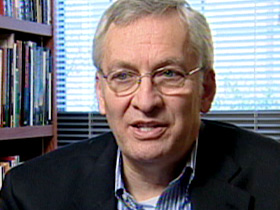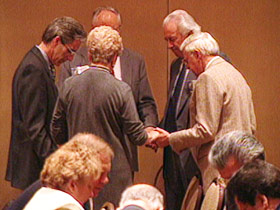Leith Anderson
BOB ABERNETHY, anchor: The National Association of Evangelicals (NAE) represents 60 Protestant denominations made up of 45 thousand churches with 30 million members. Early this month, the NAE’s president, The Reverend Ted Haggard, had to step aside because of a sex and drug scandal. His interim successor is The Reverend Leith Anderson, pastor of the 5000-member Wooddale Church outside Minneapolis. Anderson insists the Haggard tragedy will have no effect on the health of the NAE, which he described to Fred de Sam Lazaro as a group that is increasingly diverse.
FRED DE SAM LAZARO: Leith Anderson leads a megachurch, just as his predecessor at the National Association of Evangelicals did. But that’s where a lot of the similarities end. Colorado-based Ted Haggard was politically active and until his resignation a prominent voice behind that state’s recent ballot measure to ban same sex marriage.
Rev. LEITH ANDERSON (Wooddale Church, Eden Prairie, MN, speaking at church service): I invite you to believe in Jesus who died on the cross to pay for your sins.

DE SAM LAZARO: Anderson seems comfortable with the relative anonymity at the 5000-member church in suburban Minneapolis he’s led since 1977.
Rev. ANDERSON: I certainly have no obligation to continue his or anyone else’s agenda. I do think that Ted Haggard was particularly involved in political issues in Colorado, which are not always the same political issues elsewhere. I think that we need to again recognize that America is a varied and diverse place.
DE SAM LAZARO: He says that diversity that was evident in the way evangelicals voted in the recent elections.
Rev. ANDERSON: One of the numbers that I read in the press was an estimate that one-third of evangelicals voted as Democrats and two-thirds voted as Independents or Republicans. If that number is correct that would show a two-to-one diversity, at least in terms of blue and red. There are certainly many evangelicals who hold conservative-right politics, but there are many who do not. I think in the past there has been a misperception that the group is something of a monolith in terms of race and politics and a multitude of other areas, where individuals have been perceived as the spokespersons for many when in fact they may be the spokespersons only for some.

DE SAM LAZARO: On the political front, Anderson says evangelicals have stuck solidly together in opposing legalized abortion. But there are fractures on other issues, notably global warming. Anderson is among a group of leaders signing on to the Evangelical Climate Initiative. The document calls for urgent action to curb climate change that it says is caused by human activities.
Rev. ANDERSON: The purpose was to put climate concerns, what we would call creation-care issues, on the evangelical agenda, and I think that was highly successful. So it has significantly come into evangelical conversation.
DE SAM LAZARO: But many leading evangelical pastors, along with the Bush administration, insist there’s no scientific consensus on global warming. Anderson says it’s no surprise that the wrenching debates in broader society have spilled into the evangelical community.
Rev. ANDERSON: We have had growing polarization in America and siloing. So it’s everywhere. If you look at your radio dial, we are narrow casting more than broadcasting. And within our culture, we are people shouting in a louder and louder voice to fewer and fewer people. And that is distressing to me, because I prefer that we have unity at least on some significant issues. Evangelicals are not exempt from the polarization and fracturing that is happening in the rest of society.
I think that around the world there is a great deal of fear. I think war and terrorism and other issues have made people frightened and that has often driven them back to their social, ethnic and religious roots. And that has distanced people more than it has brought them together. What I would desire and hope for is that we would find our common ground, be able to be respectful of our differences, and be able to fairly hear one another in terms of what are our beliefs, and persuasively speak on behalf of our beliefs.
DE SAM LAZARO: This isn’t the first the 62-year-old Anderson will head the National Association of Evangelicals. A few years ago, amid a financial crisis, he took over for two years. This time he says he’ll provide continuity until the group’s board finds a new president.
For Religion & Ethics NewsWeekly, this is Fred de Sam Lazaro in Minneapolis.

